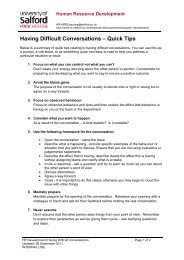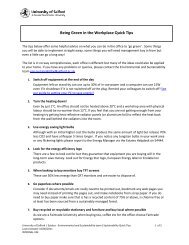Managing Attendance â Quick Tips - University of Salford
Managing Attendance â Quick Tips - University of Salford
Managing Attendance â Quick Tips - University of Salford
Create successful ePaper yourself
Turn your PDF publications into a flip-book with our unique Google optimized e-Paper software.
<strong>Managing</strong> <strong>Attendance</strong> – <strong>Quick</strong> <strong>Tips</strong>Below is a quick summary <strong>of</strong> top tips for managing attendance effectively. You can use this as a prompt,a ‘crib sheet’, or as something quick and easy to read to help you address a particular situation or issue.1. Know the policy and the processThis sounds an obvious point, but it is important to know what the policy states, and whatresponsibilities everyone has regarding issues <strong>of</strong> absence and attendance. As a manager youplay a key role in implementing the policy, but also in making sure all your staff know what isexpected <strong>of</strong> them too. It is unreasonable to expect a manager to know the full policy word forword, but there are some key points to be aware <strong>of</strong> – for example, what are the trigger pointsfor further action? When is Union representation required during the process? Whatnotification and reporting procedures are in place for your team?2. Make sure all your staff know what is expected <strong>of</strong> themAs mentioned above, as a manager you have responsibility for making sure your staff know whatthey need to do regarding absence and attendance. It would be unreasonable to challengesomeone for doing something they did not know was wrong, for example. It is also importantthat any staff which you are following the procedure for, either at the informal or formal stage,know that they still have personal responsibilities which they need to meet – such asmaintaining communication, attending meetings to discuss the issue etc., and that they alsoneed to make sure that they are following the <strong>University</strong> policy too.3. Conduct return to work interviewsThe <strong>University</strong>’s revised sickness absence policy includes a requirement that return to workinterviews are carried out for all periods <strong>of</strong> absence. In many instances this will be quick andstraightforward, but in some cases they may uncover underlying problems or other issues.Research indicates that one <strong>of</strong> the most effective ways <strong>of</strong> ensuring good attendance levels in theworkplace is having robust policies in place, and using them effectively – and return to workinterviews are a key feature <strong>of</strong> this. Conducting them will demonstrate your support for yourstaff, and also that you are following processes correctly – thereby encouraging your staff to dothe same.4. Involve HR when neededAs a line manager you are not expected to be a HR expert, in the same way you are notexpected to be a doctor! Remember that HR are available for advice and guidance on this issue,and that if you are unsure <strong>of</strong> what to do next it is highly likely that asking for advice will provebeneficial, rather than getting things wrong and then involving HR after the event.<strong>University</strong> <strong>of</strong> <strong>Salford</strong> | HR Development | <strong>Managing</strong> <strong>Attendance</strong> Toolkit 1 <strong>of</strong> 2Last reviewed: 09/03/2011INTERNAL USE
5. Involve Health, Safety and Wellbeing when neededSimilar advice here as in point 4 above – ask for advice if there is anything that you are unsure<strong>of</strong>, and make use <strong>of</strong> referrals to Health Safety and Wellbeing as these will provide advice andguidance to you on managing absence. Remember that an employee who is <strong>of</strong>f sick is still anemployee even if they are not physically attending work, and as such we still have a duty <strong>of</strong> caretowards them. This is particularly important in relation to long term sickness absence, whereearly involvement <strong>of</strong> Health Safety and Wellbeing can help to fulfil that duty <strong>of</strong> care.6. Gather facts and informationIn any people management procedure you will need to ensure that you manage by fact –therefore gathering information, looking at absence records, and identifying trends are all keyactivities you will need to do in order to tackle problems effectively. Avoid making assumptions,such as deciding yourself whether someone is fit to return to work or not, or managing on thebasis <strong>of</strong> hearsay or anecdotes from others. If you were on the receiving end <strong>of</strong> this type <strong>of</strong>management your likely response would be to say “prove it!” – make sure you can.7. Plan and prepare for meetings about absenceAs well as gathering information in advance <strong>of</strong> any meetings you have regarding attendance,make sure you plan and prepare what you are going to cover, and what the outcomes <strong>of</strong> yourmeeting need to be. This will make sure that you don’t miss anything, and that you followprocedures correctly. Ensure that your plan covers what you are going to say during theintroduction to your meeting, and what the next steps will be. There are a series <strong>of</strong> managerschecklists that have been produced by HR to assist you with this.<strong>University</strong> <strong>of</strong> <strong>Salford</strong> | HR Development | <strong>Managing</strong> <strong>Attendance</strong> Toolkit 2 <strong>of</strong> 2Last reviewed: 09/03/2011INTERNAL USE


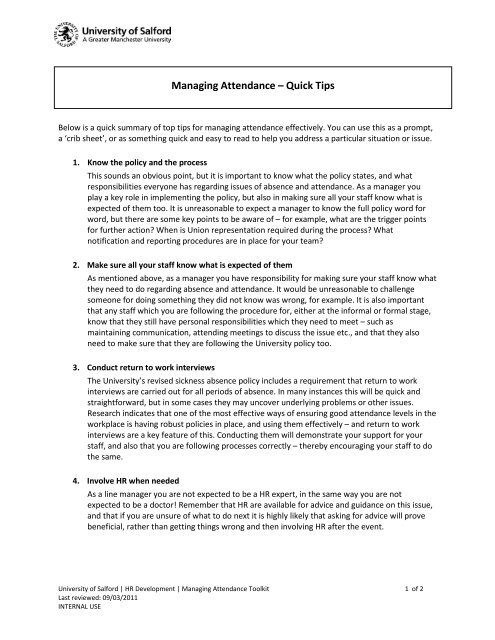
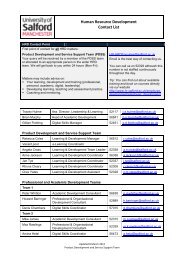
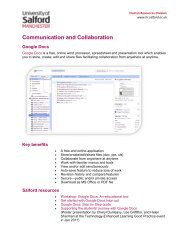

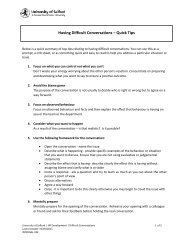
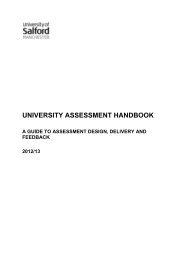

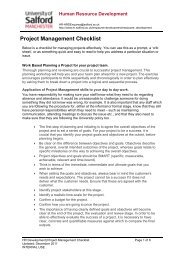

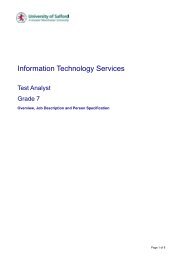

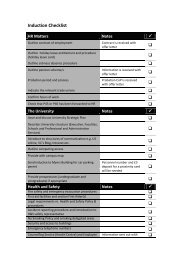
![download in full [pdf] - Human Resources - University of Salford](https://img.yumpu.com/24213210/1/184x260/download-in-full-pdf-human-resources-university-of-salford.jpg?quality=85)
